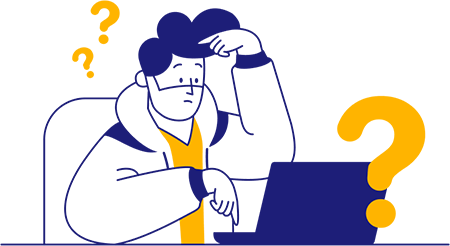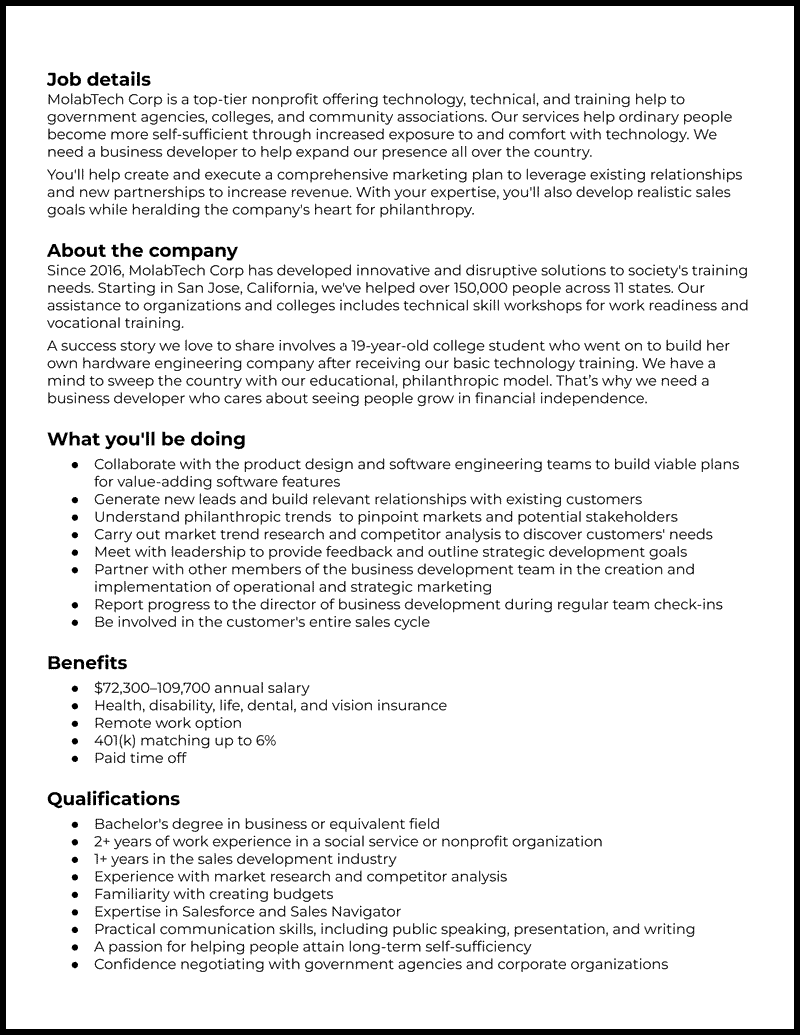You want your company to grow, so you’re hiring a business developer—someone who’ll help find additional ways to get new customers and sell more of your products or services. A great business developer is a key player to bring your business into uncharted, profitable markets.
Business developers have superb communication skills that help them make presentations to stakeholders in sales deals or convert leads to customers. They collaborate and strategize to broaden the company’s influence and hit proposed growth targets. All in all, they’re pretty incredible.
Finding and hiring a business developer can feel like a hundred-to-one shot, but we’ll provide practical examples and guidance so you can hook the business development heavyweights with the right job skills and business development resumes.
Write Your Best Business Development Job Description

Writing an attractive job description for any position can be difficult, and many job descriptions fail to impress. Generally, they fail because they’re too generic—lacking specifics about the responsibilities applicants will perform, the qualifications you require, and the benefits.
And some job descriptions contain lengthy paragraphs of garden-variety roles and a gum wrapper’s worth of perks. Such job ads can scare off good applicants who fear they’ll be working for peanuts.
To write the best business development job description, give applicants details about their roles, such as “actively following up on leads” and “performing competitor analysis.” Include the required qualifications and benefits while keeping sections brief and easy to read. Your benefits should also complement the applicant’s responsibilities and qualifications by being proportional.

Figure out who you need on your team and why
To attract the best applicants, you should express why you want to hire them. Research shows that when people understand why they’re needed, they’ll believe they’re involved in something special. So, sharing why you need them can give applicants a purpose-filled reason to join you.
- Do you want to expand your presence across the country?
- Do you want to network with high-profile customers at prominent events?
Whatever your business need, be sure to mention it in an effort to weed out uninterested applicants, leaving you with those who will be a better match. The best way to write your business development job description is to lead by example and reflect the qualities you want from hires in the job description:
- It’s a no-brainer that you want someone with practical communication skills and a contagious passion for your services. But, does your job description show that you value these requirements?
- For example, to build customer relationships, your hire must be strong in written communication and email marketing, but does your job description read with the appeal and flow of a bestseller or more like a word scramble?
- You want your hire to have a passion for your services to connect with customers quickly, but does your job description express your own enthusiasm?

Edit and revise for a fully developed job description
Business developers don’t need to read lengthy descriptions to understand the job. Avoid fillers and excess. Instead, use industry-specific language, and make your piece clear. Don’t dump everything you can conceive about business development into the job description. The reader should be at ease reading about the role—not sweating bullets.
Once you’ve completed the above, take time to revise and edit before posting. We understand you’ve put in a lot of work, and you’re eager to send it on its merry way. However, take a breath, and check for grammatical errors, typos, or incorrect information. Take a day and give it to someone else to proofread. When you’re finally satisfied with your work, post it and wait for those high-quality business development resumes to roll in!
Start by Outlining Your Business Development Job Description

Here’s an outline that covers the essentials for business development job descriptions:

Job details
This quick introduction to the job and your company will tell applicants what services you offer and in which industry you operate. It will also show them why you want them to join your company.
Remember to keep this section brief as it’s only to help readers get a taste of your business. It’s also a fantastic place to include an overview of their responsibilities, so they can get an idea of their purpose in the company. Use this section to entice like-minded applicants to read further.

About the company
Give more details about the company—where you’re located, what keeps you kicking, and what goals you have. Business development professionals will want to know the company’s mission to figure out if they fit in with that vision.

What you’ll be doing
This section should pack a punch in a small amount of space. Use bullet points to convey what you’d like to see in the applicant. Most readers will glance at this section first to understand what’s expected, so keep it short. Despite trying to make it brief, be sure to cover the unique tasks of a business developer within your company. Use active verbs while avoiding fluff and jargon.
- Collaborate with the product design and software engineering teams to build viable plans for value-adding software features
- Generate new leads and build relevant relationships with existing customers
- Understand philanthropic trends across states to pinpoint feasible markets and potential stakeholders
- Carry out market trend research and competitor analysis to discover customers’ needs and best market entry strategies

Qualifications
This is a key section of the job description because it shows applicants what they need to have to land the job. Many business developer job descriptions share similar qualifications, so keep yours brief and easy to digest.
Ensure your company’s unique qualifications in education, relevant work experience, and proficiency in specific tools are listed. For soft skills, include those relevant to business developers, such as “strong communicator” and “confident,” but minimize their usage; long lists of requirements can discourage readers.
- Bachelor’s degree in business or equivalent field
- 2+ years of work experience in a social service or nonprofit organization
- 1+ year in the sales development industry
- Experience with market research and competitor analysis

Salary and benefits
If the reader has made it as far as your benefits section, don’t scare them away with vague or (worse—nonexistent) promises. Be specific.
You can place this section anywhere in the job description. Consider listing it early on if your company’s benefits are your central selling point. Determine the best place for it—just so it’s easy for applicants to glimpse what they stand to gain by joining your company.
Functions Inside the Business Development World

Although the primary role of a business developer is to get more revenue and customers for the company, there are other responsibilities they’ll perform. Below are examples of the various roles to include in a business development job description. One business developer may not perform all these responsibilities, but they’re excellent examples of the possibilities.

Relationship-building
Customers might not buy a product if they have no personal connection with the company, but building customer rapport can give a business a market advantage. Deepening a relationship with a client usually involves hours of communication and feedback, so business developers savvy in building relationships can bridge the gap between a business and its clients.
- Generate new leads, inform them of your solution to their business needs, and follow up after the conversation.
- Be involved in the customer’s entire sales cycle and ask for feedback after closing the sale.
- This role will require experience in sales and marketing, proficiency in crafting persuasive mails with email marketing tools, and knowledge of Salesforce and Sales Navigator. Must also have excellent communication skills and the confidence to approach prospective customers.

Storytelling
Customers can get tired of sales pitches and promotional emails containing dry facts, but a cleverly crafted message can spark their interest. Storytelling can engage clients emotionally, causing them to resonate with the product or service and take action. Business developers must be able to weave the company’s offerings into tales that will trigger customer action.
- Understand the target audience and create intriguing stories to connect customer needs with the company’s products.
- Partner with the marketing team to implement strategic and operational marketing.
- This role will require experience in market research and customer analysis. Must also possess creativity, curiosity about customer receptivity to marketing, and the ability to collaborate with members of other teams.

Team management
The business development pro often encounters a swinging pendulum of personalities and motivation levels; from the “tired” to the “turbo salesperson,” this team leader galvanizes and motivates the squad. They also act as a coach, mentoring the sales staff and directing their eyes to the prize (sales target).
- Lead the sales development team in motivation while providing the tools and resources for their success.
- Direct the business development team to ensure the highest level of customer support.
- This role will require leadership and management experience in business development. Must also have the ability to motivate team members.

Business intelligence
Without accurate data, it can be difficult for a business to make informed decisions. Business intelligence can improve the decision-making process by ensuring accurate data, visualization of historical growth patterns, and access to competitors’ offerings. Business developers should be expert in business intelligence tools to share essential information with company management.
- Meet with company leadership to provide feedback on growth patterns, market research, and competitor analysis and outline strategic development goals.
- Keep up with trends to recognize new expansion opportunities and outline expansion methodologies.
- This role requires Salesforce experience, market research proficiency, and familiarity with competitor analysis. Must also have expertise in Microsoft Excel and PowerPoint.

Collaboration
Expecting members of several teams to work well on a single project can be a recipe for mayhem, but a business developer with the skill of collaboration can calm and bring order to the troops while also satisfying customers. Business developers must be able to collaborate with people from different departments in the company.
- Collaborate with the product design and software engineering teams to build viable plans for value-adding software features.
- Partner with the sales and marketing teams to plan and execute operational marketing campaigns.
- This role will require familiarity with Microsoft 365 products, Slack, Zoom, and Skype. Must also have the ability to partner effectively with members of other departments.

Project management
Anyone who’s ever tried to manage a home renovation long-distance knows it’s almost impossible. Someone has to be on-site to ensure success. A business developer with project management skills can plan, direct, and execute the project, fulfilling the company’s goals, increasing revenue and clientele.
- Oversee the creation and implementation of the company’s goal to expand into neighboring countries.
- Track team progress through regular team meetings and check-ins.
- This role will require leadership experience, analytical skills, and proficiency in communication tools. Must also possess the ability to use time effectively and multi-task.








